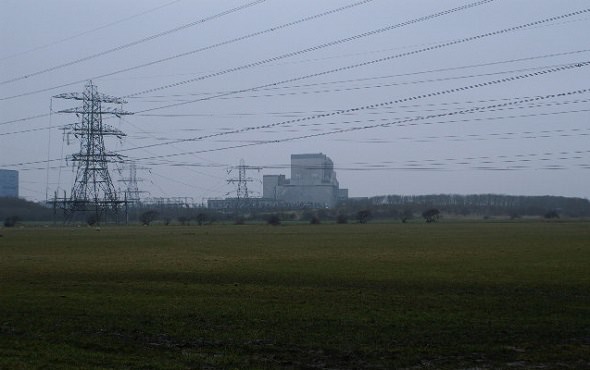Europe Provides State Support for Nuclear Power
The controversial decision that Europe will allow state subsidies for nuclear power is likely to face a legal challenge by opponents who believe it will kill off the market for renewable energy.
By Paul Brown, Climate News NetworkThis piece first appeared at Climate News Network.
LONDON — The European Commission has now agreed that Britain can subsidise the building of the world’s most expensive nuclear power station — despite previously believing that the deal breaks the European Union’s rules on state aid.
The £16 billion plant planned for Hinkley Point in Somerset, south-west England, was approved by just one vote at a meeting yesterday of the EC. And the decision was made even more controversial by the fact that the current members of the Commission end their term of office this month.
The new commissioners, who were not consulted over the issue, are now expected to face a series of challenges in the European Court of Justice over the legality of the deal.
The two European Pressurised reactors of 1.650 megawatts each that are planned for Hinkley Point by the French state-owned energy giant EDF are supposed to be constructed by 2023, but the track record of the nuclear industry is so poor that this is unlikely.
Over budget
A similar single reactor being built by the same company at Flamanville in France was scheduled to be completed by 2012, but is already four years late and €5 billion over budget.
The British government subsidy comes in the form of a guaranteed price for the electricity of £92.50 per megawatt hour for all the energy that the power station generates. This is double the current price of electricity, and the government has to buy it whether or not the electricity is needed.
Announcing yesterday’s decision, the EC Vice-President, Joaquin Almunia, said these subsidies had been modified so that if EDF made excess profits some money would be returned to the British taxpayer.
For the nuclear industry, the decision is a shot in the arm as it has never been possible to finance a nuclear power station without state aid. This is because private enterprise is not prepared to put up the massive capital and have it tied up in the power stations for a decade or more before there is any financial return.
The UK wants to build a whole series of new reactors on similar subsidies, and both Poland and the Czech Republic have expressed a wish to do the same because they fear that they are too reliant on Russian gas for their energy needs.
Lord Hutton of Furness, chairman of the Nuclear Industry Association, described the EC’s approval as “an important step”.
Ageing generation
He said: “This will set in train an important time for the nuclear sector in the UK as new-build projects get under way to replace the current ageing generation. It also gives certainty to other European countries looking at the UK system of contracts for difference as a mechanism to secure their own supply.”
Garry Graham, Deputy General Secretary of the Prospect trade union, said: “This is fantastic for jobs, consumers and the UK economy. Nuclear new-build is a key component in providing the UK with low-carbon energy generation.
“When operational, Hinkley Point C will provide seven per cent of our energy needs for generations to come. Its construction and operation will provide thousands of high-quality skilled jobs, while the £16bn investment will give a real boost to businesses on both a local and national level.”
However, even before the decision was announced, Austria, which strongly supports renewable energy sources, had already threatened to take the EC to the European Court of Justice to challenge the decision.
The Austrians are unlikely to be alone. A group of energy companies, scientists and associations have also been looking at a legal challenge.
Profoundly disappointed
One of those involved is Paul Dorfman, from the Nuclear Consulting Group. He said: “We are profoundly disappointed that the outgoing European Commission administration has decided to rush through this decision to approve state aid to Hinkley Point C without giving the new Commission the opportunity to review and reflect on a decision that will set a significant precedent on energy and competition policy.
“That this decision has been taken in undue haste only strengthens the grounds for, and likely success of, a legal challenge.
“The decision document refers to a significant body of new evidence from the UK and EDF, yet there is no adequate access to this information — which means that it is impossible to check the validity of this information.
“Since this evidence has persuaded the Commission to change its mind, it is important that this is properly scrutinised and validated before any final conclusion was made.
“We will be unable to make any further detailed comment until the material is released. However, we are convinced that this state aid will distort the UK and pan-EU energy market. Subsidies should not be provided to a mature technology like nuclear. We will be working with those directly and indirectly impacted by its distortive impacts over the coming weeks to put together our case.”
Andrea Carta, EU legal adviser for Greenpeace, said: “There is absolutely no legal, moral or environmental justification for turning taxes into guaranteed profits for a nuclear power company whose only legacy will be a pile of radioactive waste.”
Your support matters…Independent journalism is under threat and overshadowed by heavily funded mainstream media.
You can help level the playing field. Become a member.
Your tax-deductible contribution keeps us digging beneath the headlines to give you thought-provoking, investigative reporting and analysis that unearths what's really happening- without compromise.
Give today to support our courageous, independent journalists.









You need to be a supporter to comment.
There are currently no responses to this article.
Be the first to respond.